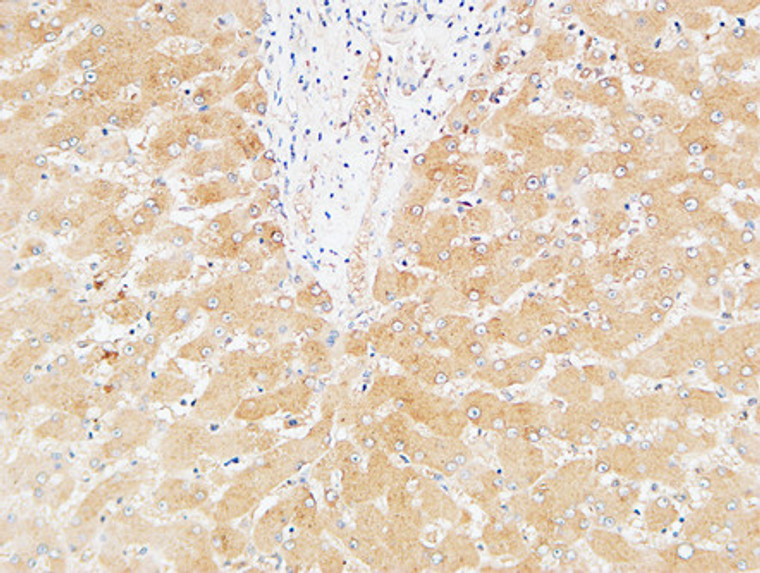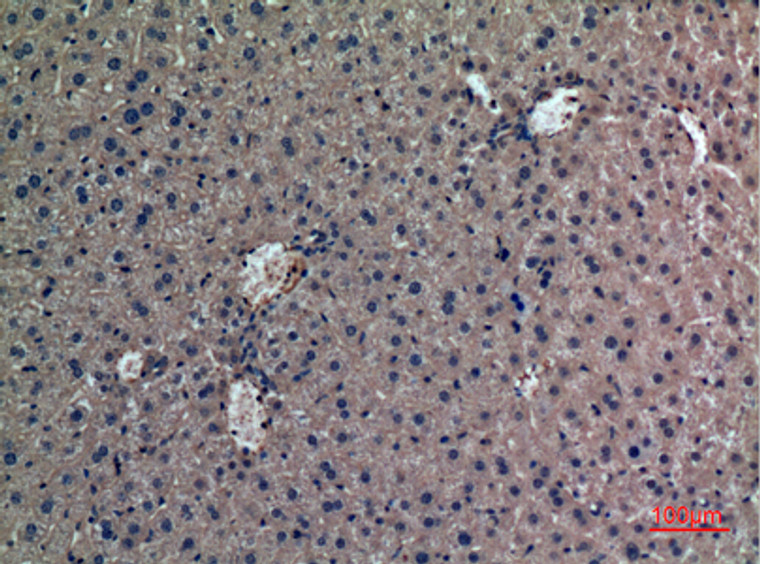| Host: | Rabbit |
| Applications: | WB/IHC/IF/ELISA |
| Reactivity: | Human/Mouse/Rat |
| Note: | STRICTLY FOR FURTHER SCIENTIFIC RESEARCH USE ONLY (RUO). MUST NOT TO BE USED IN DIAGNOSTIC OR THERAPEUTIC APPLICATIONS. |
| Short Description: | Rabbit polyclonal antibody anti-Prothrombin (420-470 aa) is suitable for use in Western Blot, Immunohistochemistry, Immunofluorescence and ELISA research applications. |
| Clonality: | Polyclonal |
| Conjugation: | Unconjugated |
| Isotype: | IgG |
| Formulation: | Liquid in PBS containing 50% Glycerol, 0.5% BSA and 0.02% Sodium Azide. |
| Purification: | The antibody was affinity-purified from rabbit antiserum by affinity-chromatography using epitope-specific immunogen. |
| Concentration: | 1 mg/mL |
| Dilution Range: | WB 1:500-1:2000IHC-P 1:100-300ELISA 1:20000IF 1:50-200 |
| Storage Instruction: | Store at-20°C for up to 1 year from the date of receipt, and avoid repeat freeze-thaw cycles. |
| Gene Symbol: | F2 |
| Gene ID: | 2147 |
| Uniprot ID: | THRB_HUMAN |
| Immunogen Region: | 420-470 aa |
| Specificity: | Prothrombin Polyclonal Antibody detects endogenous levels of Prothrombin protein. |
| Immunogen: | Synthesized peptide derived from the Internal region of human Prothrombin at the amino acid range 420-470 |
| Post Translational Modifications | The gamma-carboxyglutamyl residues, which bind calcium ions, result from the carboxylation of glutamyl residues by a microsomal enzyme, the vitamin K-dependent carboxylase. The modified residues are necessary for the calcium-dependent interaction with a negatively charged phospholipid surface, which is essential for the conversion of prothrombin to thrombin. N-glycosylated. N-glycan heterogeneity at Asn-121: Hex3HexNAc3 (minor), Hex4HexNAc3 (minor) and Hex5HexNAc4 (major). At Asn-143: Hex4HexNAc3 (minor) and Hex5HexNAc4 (major). In the penultimate step of the coagulation cascade, prothrombin is converted to thrombin by the prothrombinase complex composed of factor Xa (F10), cofactor Va (F5), and phospholipids. This activation requires factor Xa-catalyzed sequential cleavage at 2 sites, Arg-314 and Arg-363, along 2 possible pathways. In the first pathway, the first cleavage occurs at Arg-314, leading to the formation of the inactive intermediate prethrombin-2. This pathway preferentially occurs on platelets and in the absence of cofactor Va. In the second pathway, the first cleavage occurs at Arg-363, which separates protease domain into 2 chains that remain connected through a disulfide bond and generates the active intermediate meizothrombin. The presence of cofactor Va directs activation along the meizothrombin pathway and greatly accelerates the rate of cleavage at Arg-363, but has a smaller effect on the cleavage of meizothrombin at Arg-314. Meizothrombin accumulates as an intermediate when prothrombinase is assembled on the membrane of red blood cells. |
| Function | Thrombin, which cleaves bonds after Arg and Lys, converts fibrinogen to fibrin and activates factors V, VII, VIII, XIII, and, in complex with thrombomodulin, protein C. Functions in blood homeostasis, inflammation and wound healing. |
| Protein Name | ProthrombinCoagulation Factor Ii Cleaved Into - Activation Peptide Fragment 1 - Activation Peptide Fragment 2 - Thrombin Light Chain - Thrombin Heavy Chain |
| Database Links | Reactome: R-HSA-140837Reactome: R-HSA-140875Reactome: R-HSA-159740Reactome: R-HSA-159763Reactome: R-HSA-159782Reactome: R-HSA-202733Reactome: R-HSA-375276Reactome: R-HSA-381426Reactome: R-HSA-416476Reactome: R-HSA-456926Reactome: R-HSA-76009Reactome: R-HSA-9657688Reactome: R-HSA-9672391Reactome: R-HSA-977606 |
| Cellular Localisation | SecretedExtracellular Space |
| Alternative Antibody Names | Anti-Prothrombin antibodyAnti-Coagulation Factor Ii Cleaved Into - Activation Peptide Fragment 1 - Activation Peptide Fragment 2 - Thrombin Light Chain - Thrombin Heavy Chain antibodyAnti-F2 antibody |
Information sourced from Uniprot.org
12 months for antibodies. 6 months for ELISA Kits. Please see website T&Cs for further guidance














